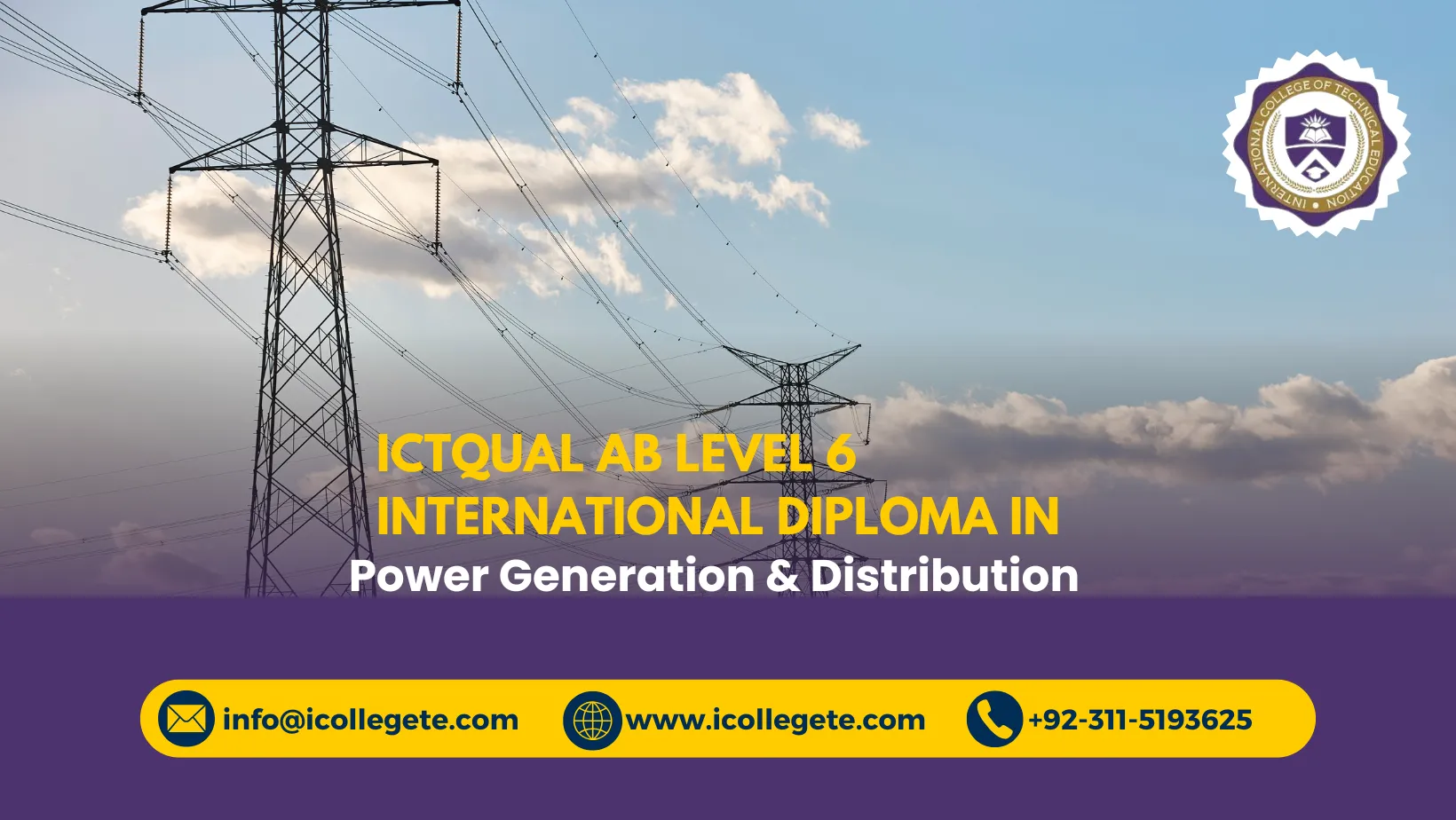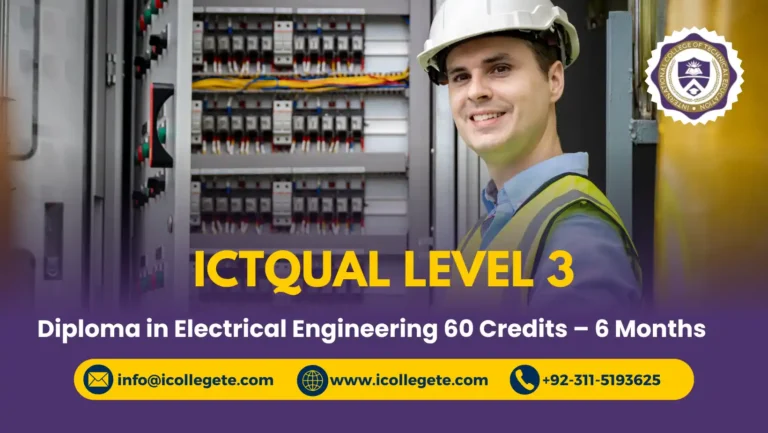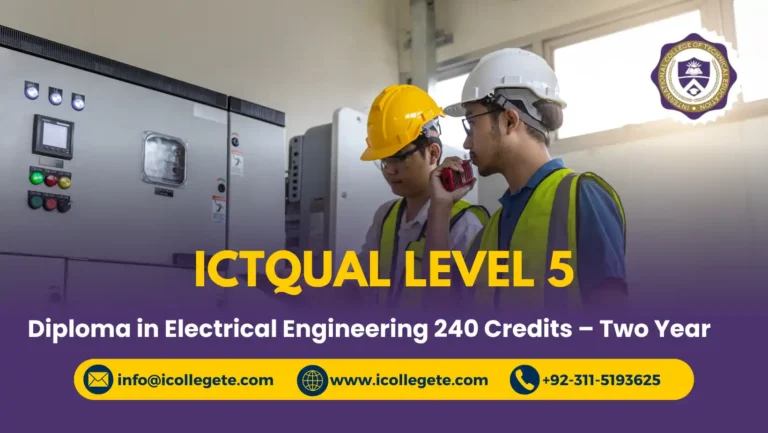The ICTQual AB Level 6 International Diploma in Power Generation & Distribution is an advanced professional qualification designed to prepare learners for leadership and technical roles in the global power and energy industry. ICTQual AB Level 6 International Diploma in Power Generation & Distribution focuses on the principles, technologies, and management systems that drive modern power generation and distribution networks. ICTQual AB Level 6 International Diploma in Power Generation & Distribution covers both conventional and renewable power systems, providing learners with the skills needed to design, operate, and manage energy infrastructure efficiently and sustainably.
As global energy demands continue to grow, the need for skilled professionals who understand the intricacies of power systems becomes increasingly important. ICTQual AB Level 6 International Diploma in Power Generation & Distribution addresses the entire energy value chain—from electricity generation through transmission to final distribution—emphasizing reliability, safety, and environmental responsibility. Learners will gain a deep understanding of power generation technologies such as thermal, hydro, nuclear, solar, and wind energy, as well as modern grid management and smart distribution systems.
ICTQual AB Level 6 International Diploma in Power Generation & Distribution is ideal for individuals working in or aspiring to enter the electrical power industry, including power plant operations, grid management, energy system design, and policy development. The ICTQual AB Level 6 International Diploma in Power Generation & Distribution integrates theoretical foundations with hands-on applications, allowing students to bridge the gap between engineering concepts and practical energy solutions. Graduates will be equipped to meet the challenges of energy transition, modernization, and digital transformation in the power sector.
The ICTQual AB Level 6 International Diploma in Power Generation & Distribution ensures learners develop strong technical, analytical, and managerial capabilities. ICTQual AB Level 6 International Diploma in Power Generation & Distribution promotes sustainable energy practices while preparing professionals to lead in an industry that is essential for global development, economic stability, and environmental stewardship.
Course Overview
The ICTQual AB Level 6 International Diploma in Power Generation & Distribution provides an in-depth understanding of how electrical energy is produced, transmitted, and distributed to meet modern energy demands. The ICTQual AB Level 6 International Diploma in Power Generation & Distribution emphasizes renewable and sustainable energy integration, smart grid systems, and efficient energy distribution methods. Learners develop both technical and managerial skills essential for success in the evolving power sector.
Course Study Units
This qualification, the ICTQual AB Level 6 International Diploma in Power Generation & Distribution, consists of 36 mandatory units.
Year 1 – Foundation in Power Generation & Distribution
- Principles of Electrical Power Systems
- Introduction to Power Generation Technologies
- Fundamentals of Thermal Power Plants
- Basics of Hydroelectric and Renewable Generation
- Electrical Machines and Circuit Theory
- Energy Conversion and Transmission Basics
- Health, Safety, and Environmental Awareness
- Power System Measurement and Instrumentation
- Laboratory Techniques in Electrical Systems
- Technical Report Writing
- Introduction to Power Simulation Software
- Energy Efficiency Fundamentals
Year 2 – Intermediate Power Generation & Distribution
- Advanced Thermal Power Plant Operations
- Renewable Integration in Power Systems
- Electrical Distribution Networks
- Grid Management and Load Analysis
- Power System Protection and Control
- Energy Storage and Backup Systems
- Process Control and Automation in Power Plants
- Energy Management Strategies
- Environmental Compliance and Sustainability in Power
- Quality Control and Assurance in Electrical Systems
- Project Planning and Technical Communication
- Data Analysis for Power Systems
Year 3 – Advanced Power Generation & Distribution
- Advanced Power Plant Optimisation and Troubleshooting
- Project Management in Energy Infrastructure
- Emerging Technologies in Power Generation
- Smart Grid Design and Integration
- Energy Storage Optimisation and Battery Technologies
- Risk Assessment and Hazard Analysis in Power Systems
- Advanced Laboratory Techniques and Field Testing
- Transmission and Distribution Network Planning
- Supply Chain and Logistics in Energy Operations
- Capstone Project in Power Generation & Distribution
- Professional Development and Leadership in Energy
- Strategic Decision-Making in Power Systems
Course Learning Outcomes
- Understand the principles and technologies of modern power generation and distribution
- Analyze and evaluate different energy generation methods and their applications
- Apply technical knowledge to manage and maintain power systems effectively
- Design and implement efficient and safe power distribution networks
- Integrate renewable energy sources into existing power grids
- Conduct power system analysis, fault diagnosis, and protection planning
- Utilize modern digital and automation tools in energy management
- Assess the environmental and economic impacts of power generation systems
- Apply international standards and safety protocols in electrical operations
- Manage power-related projects with a focus on efficiency and sustainability
- Monitor and optimize load distribution in smart grid systems
- Implement energy-saving and sustainability strategies within organizations
- Communicate effectively with multidisciplinary engineering teams
- Demonstrate leadership and decision-making in power industry contexts
- Contribute to innovation and development in the energy and utility sectors
Entry Requirements for this Course
- Level 5 diploma or equivalent qualification in electrical, mechanical, or energy engineering
- Relevant work experience in the power or energy sector preferred
- Proficiency in English language and technical communication
- Basic understanding of mathematics, physics, and electrical circuits
- Strong analytical and problem-solving abilities
- Computer literacy and familiarity with engineering software
- Interest in power generation, renewable energy, and sustainability
- Commitment to technical and safety excellence
- Ability to interpret and analyze engineering data and schematics
- Teamwork and leadership skills for project-based environments
- Motivation to pursue professional growth in energy systems
- Willingness to engage in practical and research-oriented projects
- Understanding of global energy challenges and trends
- Capacity to apply engineering principles to real-world problems
- Ethical approach to sustainable and responsible power management
Course Benefits
- Gain an internationally recognized qualification in power generation and distribution
- Develop expertise in both conventional and renewable energy systems
- Build technical proficiency in electrical power management and design
- Enhance career opportunities in energy utilities and power companies
- Acquire knowledge of smart grid and digital power technologies
- Learn best practices in energy efficiency and safety compliance
- Strengthen analytical and project management skills
- Increase employability in global power and infrastructure sectors
- Access opportunities in both government and private energy organizations
- Contribute to the development of sustainable and reliable power systems
- Stay updated with modern energy innovations and technologies
- Build leadership and operational capabilities in energy projects
- Prepare for postgraduate studies or advanced professional certifications
- Network with professionals and organizations in the global energy industry
- Contribute to solving global energy challenges through innovative solutions
Why Someone Should Choose this Course
- Provides a balance between technical expertise and management training
- Focuses on emerging technologies and renewable energy integration
- Offers global recognition and professional relevance
- Prepares learners for high-demand roles in the power sector
- Emphasizes safety, sustainability, and reliability in power systems
- Designed to meet international standards in energy management
- Suitable for professionals seeking advancement in power or utility companies
- Encourages innovation and problem-solving for real-world energy challenges
- Develops leadership and decision-making capabilities
- Offers flexibility for both technical and managerial career paths
- Promotes sustainable practices within industrial and public sectors
- Taught by industry-experienced instructors and energy experts
- Opens pathways for global employment and career growth
- Integrates modern technology with practical power engineering concepts
Who Can Enroll in this Course
The ICTQual AB Level 6 International Diploma in Power Generation & Distribution is ideal for engineers, technicians, and professionals involved in electrical power systems, utility operations, or energy infrastructure projects. ICTQual AB Level 6 International Diploma in Power Generation & Distribution is suitable for individuals seeking to upgrade their technical expertise or move into supervisory and managerial positions in the power industry.
Graduates of electrical or mechanical engineering disciplines looking to specialize in power generation and distribution will also benefit greatly. ICTQual AB Level 6 International Diploma in Power Generation & Distribution is equally beneficial for professionals working in renewable energy, grid management, or power system maintenance who wish to enhance their technical and managerial capabilities to meet global energy standards.
Future Progression for this Course
1. Academic Progression to Higher Qualifications
- Progress to Level 7 Diploma or Bachelor’s Degree in Electrical, Mechanical, or Energy Engineering
- Pursue specialized programs in Power Systems, Renewable Energy, or Smart Grid Technology
- Gain eligibility for postgraduate studies in Energy Management and Electrical Infrastructure
- Develop academic credentials for roles in research and academia
- Qualify for advanced engineering certifications recognized globally
- Strengthen theoretical knowledge through accredited higher education pathways
- Prepare for Master’s level programs in Sustainable Power and Energy Systems
- Build a foundation for lifelong academic and technical growth
2. Career Advancement in Power and Energy Sector
- Advance into managerial or supervisory positions within power generation companies
- Work as an operations or maintenance engineer in power plants or utilities
- Manage distribution networks, load balancing, and transmission efficiency
- Contribute to large-scale industrial and municipal power projects
- Develop expertise in grid management and electrical distribution systems
- Gain leadership roles in energy production, planning, and control centers
- Oversee compliance and performance in energy plant operations
- Strengthen professional standing through industry-recognized credentials
3. Transition to Renewable and Sustainable Energy Projects
- Apply existing knowledge to renewable power generation, including solar and wind systems
- Manage hybrid energy integration projects with traditional grid infrastructure
- Work on sustainable electrification and decarbonization projects globally
- Explore opportunities in alternative energy research and innovation
- Lead energy efficiency and green energy transition programs
- Collaborate with environmental engineers on sustainable power initiatives
- Gain technical expertise in renewable resource utilization
- Support the development of cleaner, future-ready energy solutions
4. Professional Certification and Skill Recognition
- Qualify for membership in recognized professional engineering bodies
- Earn certifications in energy auditing, grid design, or power system protection
- Meet global competency standards in the energy and electrical industry
- Strengthen professional credibility with accredited technical certifications
- Participate in continuous professional development programs
- Access specialized certification courses in automation and smart grids
- Build credentials that enhance employability and global recognition
- Stay updated with evolving energy regulations and safety standards
5. Opportunities in Utility and Power Distribution Companies
- Secure roles in transmission, distribution, and generation companies
- Contribute to the planning and expansion of national power grids
- Manage operation and maintenance in utility companies and substations
- Work on electrical safety and compliance within industrial facilities
- Lead inspection and troubleshooting of electrical systems
- Support infrastructure development projects in emerging economies
- Join multinational energy corporations and consultancy firms
- Develop strong networks within the utility and energy distribution sector
6. Research and Development Opportunities
- Engage in R&D projects focused on modern energy technologies
- Contribute to innovations in smart grid and energy storage solutions
- Research methods to improve system reliability and sustainability
- Participate in academic and industrial collaborations
- Publish research on advanced power systems and efficiency techniques
- Experiment with automation, IoT, and AI-driven power technologies
- Study power infrastructure challenges and propose new solutions
- Help shape future energy policies through technical research
7. Consultancy and Technical Advisory Roles
- Provide expert consultation on power distribution and network optimization
- Advise on project design, energy system planning, and implementation
- Support industries in reducing energy losses and improving efficiency
- Deliver technical training and capacity-building workshops
- Work with governments and NGOs on rural electrification projects
- Provide risk assessments for high-voltage and renewable systems
- Help organizations transition to more sustainable power solutions
- Offer guidance in compliance, safety, and performance audits
8. Entrepreneurship and Business Development in Power Solutions
- Establish a business in electrical power installation or distribution services
- Develop and supply renewable and hybrid energy systems
- Launch an energy auditing or consultancy firm
- Innovate smart technologies for efficient power management
- Provide maintenance and testing services for power equipment
- Collaborate on infrastructure development projects regionally and internationally
- Invest in renewable startups and green technology ventures
- Build a sustainable business model around future energy solutions



